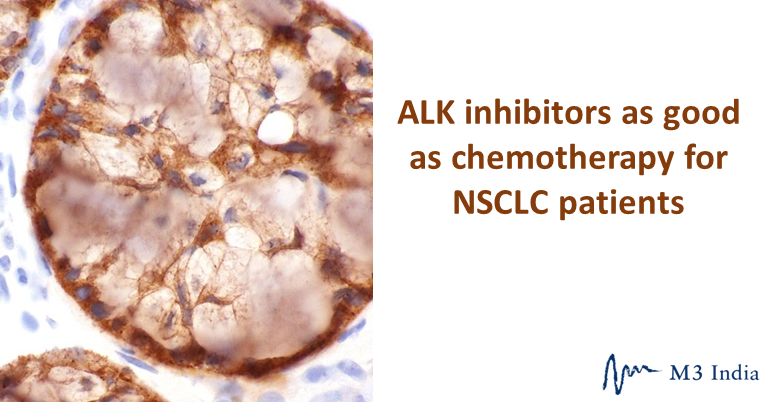ALK inhibitors as good as chemotherapy for NSCLC patients
M3 Global Newsdesk Jun 24, 2019
For patients with non-small-cell lung cancer (NSCLC), ALK-targeted therapy results in slightly less incidence of severe neutropenia and somewhat greater progression-free survival (PFS) than chemotherapy, the standard of care, according to results of a meta-analysis published in Future Oncology.

Specifically, the incidence of severe (grade 3-4 neutropenia) among NSCLC patients on chemotherapy was nearly 15% compared with just 7% among NSCLC patients on ALK-inhibitor therapy. However, the difference was not statistically significant, the investigators noted.
In addition, ALK-inhibitor therapy resulted in significantly better median PFS than chemotherapy, with response rates of 39%-74% compared with response rates of 7%-45% with chemotherapy.
Classification of lung cancers
Lung cancer represents a worldwide menace that contributes to extensive disease burden as well as economic burden. In 2018, lung cancer was the most common cancer diagnosis besides breast cancer, and represented the number one cause of cancer death, claiming 1.8 million lives worldwide. In the United States alone, the cost of lung cancer amounted to over $13.9 billion, according to 2017 data.
The vast majority of lung cancers (85%-90%) are NSCLCs, including the adenocarcinoma, squamous cell carcinoma, and large cell carcinoma subtypes. Roughly 40% of NSCLC patients present with advanced stage disease.
Standard treatment for NSCLC
According to the American Society of Clinical Oncology and the European Society for Medical Oncology, recommended therapy for advanced stage NSCLC has been platinum-based chemotherapy utilizing cisplatin and carboplatin. These agents represent the gold standard of care for patients with locally advanced or metastatic NSCLC.
Among NSCLC patients, experts estimate that 3%-7% have rearrangements, mutations, or amplification of the ALK gene, which is called ALK-positive NSCLC. Alterations in this gene have been implicated in the development of not only NSCLCs, but also neuroblastoma, lymphoma, and breast cancers.
For ALK-positive NSCLC patients, the National Comprehensive Cancer Network does not recommend cisplatin-based regimens. However, some platinum-based and single-agent chemotherapy agents have been used, despite the lack of strong evidence that they can improve overall response rate or overall survival rates in NSCLC patients.
Instead, targeted molecular therapy with ALK inhibitors has become the treatment of choice after rapid approval of crizotinib in 2011. With their success in phase 1 and 2 clinical trials, improved survival odds, and unique safety profile, ALK-inhibitors have become an important treatment option for ALK-positive NSCLC patients.
Unfortunately, resistance to ALK-inhibitor therapy develops in the majority of patients receiving crizotinib within 12 months of treatment. Although second- and third-generation ALK inhibitors have ameliorated some of the effects of resistance, response rates remain around 50%-55%.
While ALK-inhibitor therapy is well tolerated compared with chemotherapy, the risk of grade 3-4 neutropenia, a common side effect of platinum-based chemotherapy, is a serious and life-threatening complication. Neutropenia—particularly febrile neutropenia—is responsible for not only hospitalization of patients on myelosuppressive chemotherapy, but also leads to dose modifications to reverse and control the neutropenia. In turn, these dose reductions have been linked to shorter overall survival.
For this meta-analysis, which included five large, phase 2/3 clinical trials, researchers aimed to compare the incidence of grade 3-4 neutropenia in NSCLC patients who received either ALK inhibitors or chemotherapy.
In patients receiving chemotherapy, 14.7% (n=95) reported grade 3-4 neutropenia vs 7.0% (n=60) among those who received ALK-inhibitor therapy with either crizotinib, ceritinib, or alectinib. Statistical analysis of these data, however, indicated that the difference was not significant. Despite this, researchers hope that further data can be collected to elucidate the effect of ALK-inhibitors on the development of neutropenia.
Other notable findings
In four of the studies comparing ALK-inhibitor therapy vs chemotherapy, researchers observed a significant improvement in median PFS in ALK-treated patients. Improved response rates ranged from 39%-74% in ALK-treated patients compared with 7%-45% in patients given chemotherapy.
The incidence of adverse events was similar in both treatment groups, with gastrointestinal side effects being the most common in the ALK inhibitor therapy group and fatigue the most common in patients on chemotherapy.
Overall, the authors of this study concluded that their results “demonstrate that therapy with an ALK inhibitor lengthens PFS, improves overall survival and increases response rates, while having an acceptable toxicity profile, compared with chemotherapy in both treatment-naive and previously treated patients with ALK-positive NSCLC.”
This story is contributed by Soha Mahmoud and is a part of our Global Content Initiative, where we feature selected stories from our Global network which we believe would be most useful and informative to our doctor members.
-
Exclusive Write-ups & Webinars by KOLs
-
Daily Quiz by specialty
-
Paid Market Research Surveys
-
Case discussions, News & Journals' summaries